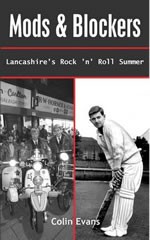Mods and Blockers
Martin Chandler |Published: 2009
Pages: 215
Author: Evans, Colin
Publisher: Max Books
Rating: 5 stars

A career journalist Colin Evans was, for many years, the cricket correspondent of the Manchester Evening News. It is tricky to categorise this, his first book, as nothing quite like it has appeared in print before but essentially the book concerns the events of 1965. Of its two main themes the first is the fortunes of Lancashire County Cricket Club, and opening batsman David Green in particular, in what was a far from easy season for them. Much of the book is also taken up with Evans’ memories of his own life in 1965 when, as a 17 year old with his first job in journalism, he had, for the first time, a few pounds in his pocket and, as 17 year old males are wont to do, went off in search of wine, women and song, or, in his case, ale, lasses and r ‘n’ b.
The cricket content relates to an era in Lancashire cricket which is seldom remembered and is badly chronicled. The, to 21st century eyes, faintly ludicrous way in which the club was run in those days is explained and through David Green’s observations, supplemented by the gossip that Evans picked up through his years in journalism, the life of a professional cricketer is portrayed from a somewhat unconventional viewpoint.
As to the autobiographical aspects the fact that Evans’ experiences as a 17 year old are in no way unusual does not detract at all from the interest in the stories that crop up every couple of pages throughout the book. To this reviewer, half a generation or so younger than Evans, many very similar memories were stirred and it was brought home to me that my own 17 year old son, who I regularly profess not to understand at all, is in truth no more mysterious than I, and before me Colin Evans were.
A slightly less obvious theme in the book, although the reader is constantly reminded of it, is the state of society in 1965. On a global scale issues such as the Vietnam war and the Civil Rights Movement are raised although of more immediate concern to Evans were the changes that were occurring in British society as it moved from the post war austerity of the 1950’s towards the very different society, particularly for young people, that evolved by the end of the 1960’s.
The diverse range of subject matter brings to mind that famous CLR James’ question “What do they know of cricket who only cricket know?”. Tempting as it is to draw comparisons with the seminal “Beyond a Boundary”, there is an underlying hint of humour and irreverence throughout Evans’ work which, realistically, make the comparison inappropriate, but the attempt to put cricket in a wider context is a rarity and the two books certainly have that in common.
In terms of attributing a rating to this book I had to dust off the criteria that we use. I was made aware when I began my tenure on the CW review team that the possibility of a five star book was to be treated as a pipe dream and was not something reviewers were expected to award. Towards the end of last year I decided to brave the prospect of summary dismissal and told Archie that Stephen Chalke’s biography of Bob Appleyard, ‘No Coward Soul’, had to be given five stars. I take the same risk again here. This is a wonderfully entertaining yet thought provoking read and its originality is, for me, the decisive factor, which outweighs the argument that the subject matter might limit the book’s appeal – anyone who chooses not to buy simply because they are not interested in Lancashire cricket in the 1960’s completely misses the point.
Where the context requires it Evans does add some stories that postdate 1965 and, indeed, one or two that predate it but this is very much a period piece and while it will inevitably lack the originality of this I do hope that Evans is, as I write this review, working on the next volume.






Leave a comment